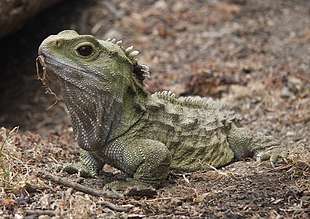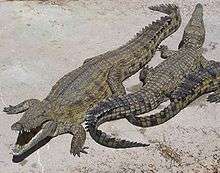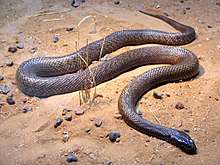reptile
English
Etymology
Middle English reptil, from Old French reptile, from Late Latin rēptile, neuter of reptilis (“creeping”), from Latin rēpō (“to creep”), from Proto-Indo-European *rep- (“to creep, slink”) (Pokorny; Watkins, 1969).
| Picture dictionary | ||||||||
|---|---|---|---|---|---|---|---|---|
|
Pronunciation
- (Received Pronunciation) IPA(key): /ɹɪpˈtaɪl/
- (General American) IPA(key): /ˈɹɛp.taɪl/
- Rhymes: -aɪl
Noun
reptile (plural reptiles)
- A cold-blooded vertebrate of the class Reptilia.
- (figuratively) A mean or grovelling person.
- 1749, Henry Fielding, The History of Tom Jones, a Foundling. In Six Volumes, volume (please specify |volume=I to VI), London: Printed by A[ndrew] Millar, […], OCLC 928184292:
- This work may, indeed, be considered as a great creation of our own; and for a little reptile of a critic to presume to find fault with any of its parts, without knowing the manner in which the whole is connected, and before he comes to the final catastrophe, is a most presumptuous absurdity.
- Charles Dickens, The Pickwick Papers
- "That reptile," whispered Pott, catching Mr. Pickwick by the arm, and pointing towards the stranger. "That reptile — Slurk, of the Independent!"
-
Hyponyms
- See also Thesaurus:reptile
Related terms
- mammal-like reptile
- Reptilia
- reptilian
- reptilianness
- reptiliology
- reptiliologist
- reptiliologists
Translations
a cold-blooded vertebrate
|
|
Adjective
reptile (not comparable)
- Creeping; moving on the belly, or by means of small and short legs.
- Grovelling; low; vulgar.
- a reptile race or crew; reptile vices
- Burke
- There is also a false, reptile prudence, the result not of caution, but of fear.
- Coleridge
- And dislodge their reptile souls / From the bodies and forms of men.
Synonyms
- (creeping, crawling): reptilious, creeping, crawling; reptitious (obsolete)
- (contemptible): See Thesaurus:despicable
See also
- herpetology
- Category:en:Reptiles for a list of reptiles in English

French
Pronunciation
Audio (file)
Derived terms
- reptilien
Further reading
- “reptile” in le Trésor de la langue française informatisé (The Digitized Treasury of the French Language).
Latin
This article is issued from
Wiktionary.
The text is licensed under Creative
Commons - Attribution - Sharealike.
Additional terms may apply for the media files.





_2012-05-11_04.jpg)


